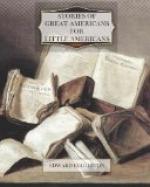She soon went back to her grand-mother. She went to school again. Then she taught school. She soon had a school in her grandmother’s house. It was a very good school. Many girls were sent to her school. Miss Dix was often ill. But when she was well enough, she worked away. She was able to send her brothers to school until they grew up.
Besides helping her brothers, she wanted to help other poor children. She started a school for poor children in her grandmother’s barn.
After a while she left off teaching. She was not well. She had made all the money she needed.
But she was not idle. She went one day to teach some poor women in an alms-house. Then she went to see the place where the crazy people were kept. These insane people had no fire in the coldest weather.
Miss Dix tried to get the man-a-gers to put up a stove in the room. But they would not do it. Then she went to the court. She told the judge about it. The judge said that the insane people ought to have a fire. He made the man-a-gers put up a stove in the place where they were kept.
Then Miss Dix went to other towns. She wanted to see how the insane people were treated. Some of them were shut up in dark, damp cells. One young man was chained up with an iron collar about his neck.
Miss Dix got new laws made about the insane. She per-suad-ed the States to build large houses for keeping the insane. She spent most of her life at this work. The Civil War broke out. There were many sick and wounded soldiers to be taken care of.
All of the nurses in the hos-pi-tals were put under Miss Dix. She worked at this as long as the war lasted. Then she spent the rest of her life doing all that she could for insane people.
THE AUTHOR OF “LITTLE WOMEN.”
Lou-i-sa Al-cott was a wild little girl. When she was very little, she would run away from home. She liked to play with beggar children.
One day she wandered so far away from her home, she could not find the way back again. It was growing dark. The little girl’s feet were tired. She sat down on a door-step. A big dog was lying on the step. He wagged his tail. That was his way of saying, “I am glad to see you.”
Little Lou-i-sa grew sleepy. She laid her head on the curly head of the big dog. Then she fell asleep.
Lou-i-sa’s father and mother could not find her. They sent out the town crier to look for her.
The town crier went along the street. As he went, he rang his bell. Every now and then he would tell that a little girl was lost. At last the man with the bell came to the place where Louisa was asleep. He rang his bell. That waked her up. She heard him call out in a loud voice,—
“Lost, lost! a little girl six years old. She wore a pink frock, a white hat, and new green shoes.”
When the crier had said that, he heard a small voice coming out of the darkness. It said, “Why, dat’s me.” The crier went to the voice, and found Louisa sitting by the big dog on the door-step. The next day she was tied to the sofa to punish her for running away.




